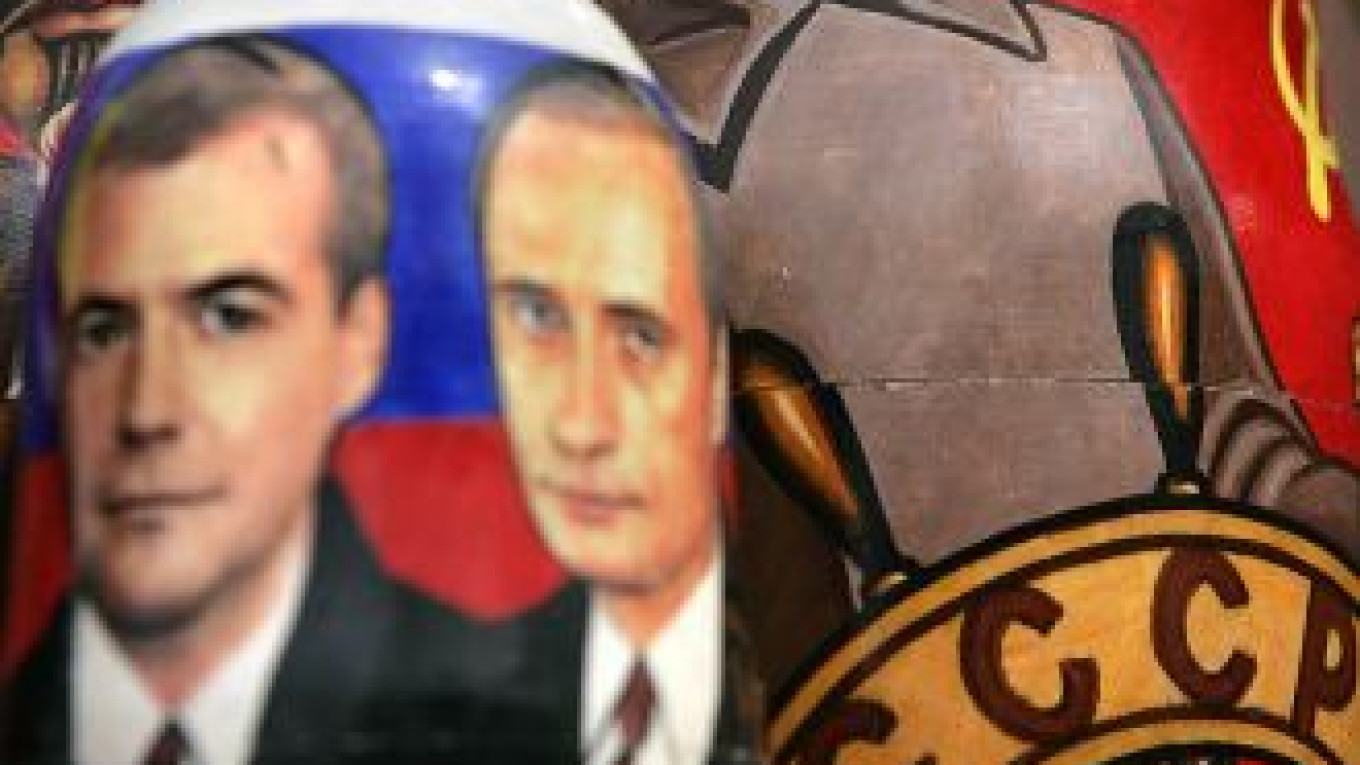Russia's leaders have finally rejected the Stalinist legacy in an outspoken and unanimous way. But the sharp ideological turn may just be an attempt to appease the West and may bear little influence on domestic policy, analysts said.
Prime Minister Vladimir Putin, previously wary of criticizing Josef Stalin, denounced the Soviet dictator's regime during a visit last month to Katyn, the site of a Stalin-ordered massacre.
The Victory Day parade on May 9 commemorated the achievements of the Soviet army, but Stalin, its commander-in-chief, was denounced by the Kremlin.
The cult of Stalin, who remains a controversial figure in Russia, will not be reinstated in the country, President Dmitry Medvedev said in a recent interview with Izvestia.
“There's no way we can say that Stalinism will return to our everyday life. … That’s absolutely impossible. This is the current state ideology and my position as the president,” Medvedev said.
"The Great Patriotic War was won by our people, not by Stalin or even military commanders," he added. "Stalin committed a lot of crimes against his people."
Medvedev also proposed declassifying and putting online a wealth of documents related to World War II, saying "the people should know the whole truth about the war.”
Putin's position was notably different from Medvedev's when he personally picked a question about Stalin's role in World War II during a call-in television show in December.
"We won the Great Patriotic War. … Even if we look back at the casualties, you know that no one can throw a stone at those who organized and led that victory, because if we had lost that war, the aftermath would have been much more catastrophic," Putin said.
But last month Putin flew to the Katyn forest to commemorate the nearly 20,000 Polish officers killed by the NKVD, the Soviet secret police, in 1940. The memory of the massacre has soured Russian-Polish relations for decades.
"There can be no excuses. In our country there is a clear political, legal and moral evaluation of the totalitarian regime's atrocities," Putin said in his speech in the Katyn forest.
Directly before and after Putin's trip to Katyn, state-run television aired a movie about the massacre directed by Polish filmmaker Andrzej Wajda. In May, Medvedev ordered the declassification of files concerning the mass murder.
The anti-Stalin line is the result of a new pro-West foreign policy, said Alexei Makarenko, an analyst with the Center for Political Technologies.
"If Russia wants to build relations with Western countries, then it should adopt the principles of those countries in which Stalin is regarded as an unacceptable figure," Makarenko said.
Stalin, who ruled the Soviet Union at a time when it became a leading industrial power but who also organized mass repressions costing millions of lives, might have served as a useful ideological prop for the Kremlin during the oil-based prosperity of the past decade, Makarenko said.
"Oil prices are dropping," he said, "and a new innovative approach is needed. But if we praise Stalin, no one will support us."
Putin, who restored Stalinist symbols during his eight-year presidency, including the Soviet national anthem composed on Stalin's orders, has long been more shy of criticizing Stalin, said Boris Dubin, a sociologist with the Levada Center, an independent polling agency.
Putin's historical lack of opposition to Stalin suggests that the anti-Stalin stance might have little affect on domestic policy, he said. "For the population, these are vague signals, and it's unclear whether they will result in more profound changes," he said.
The nation remains divided on the role of Stalin, but people are also growing increasingly indifferent about the issue, he said.
Not all officials support an anti-Stalin policy. Mayor Yury Luzhkov promised in March to place billboards of Stalin on Moscow streets to recognize Stalin's achievements as the commander of the Red Army in World War II. The idea was vehemently criticized by human right groups and dropped shortly before the celebrations, which were attended by about 20 world leaders.
But portraits of Stalin appeared on buses in St. Petersburg.
An ongoing poster campaign celebrating the 75th anniversary of the Moscow metro features an archive photo with a portrait of Stalin clearly visible.
Luzhkov's support for Stalin was probably a populist ploy aimed at war veterans who voted for the ruling United Russia party during City Duma elections in October, said Makarenko of the Center for Political Technologies.
"Besides, he might have missed the new swift [policy] changes," he said. "Last year, it would have been hard to predict that Putin would go to Katyn."
A Moscow court on Monday threw out a libel case brought by Stalin's grandson against Ekho Moskvy radio over the station's claim that the dictator sanctioned the execution of children as young as 12 during the 1930s purges, Reuters reported.
Yevgeny Dzhugashvili had lost another defamation suit in October when a Moscow judge rejected his claim that the Novaya Gazeta newspaper had smeared Stalin in an article that said he personally ordered the deaths of Soviet citizens.
A Message from The Moscow Times:
Dear readers,
We are facing unprecedented challenges. Russia's Prosecutor General's Office has designated The Moscow Times as an "undesirable" organization, criminalizing our work and putting our staff at risk of prosecution. This follows our earlier unjust labeling as a "foreign agent."
These actions are direct attempts to silence independent journalism in Russia. The authorities claim our work "discredits the decisions of the Russian leadership." We see things differently: we strive to provide accurate, unbiased reporting on Russia.
We, the journalists of The Moscow Times, refuse to be silenced. But to continue our work, we need your help.
Your support, no matter how small, makes a world of difference. If you can, please support us monthly starting from just $2. It's quick to set up, and every contribution makes a significant impact.
By supporting The Moscow Times, you're defending open, independent journalism in the face of repression. Thank you for standing with us.
Remind me later.


